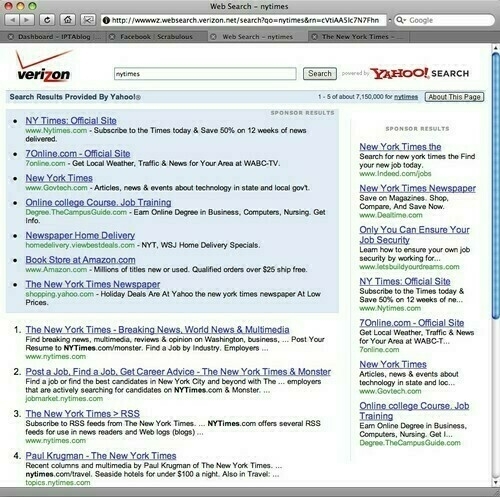Type “nytimes” into your browser’s location bar. Unless you have a local server on your network called nytimes, some web browsers (including Safari) will automatically add “http://www.” and “.com” to bring you to The New York Times at “www.nytimes.com.” Other current browsers will search for the keyword in the user’s default search engine (including IE). That is, unless you get your internet access through Verizon.
Recently, Verizon has changed the way that its DNS servers react to these domain requests. Instead of sending the browser a “host not found” message, and following the individual user’s preferences, Verizon returns its own search page:

ConsumerAffairs.com, Verizon Overrides Internet Searches With Its Own Results: “The change has been advertised by Verizon as a way to help users reach the site they were trying to get to, but some are concerned that it’s done more to gain revenue from advertisements placed on the Verizon search site.”
In 2003, Network Solutions (the company that controls the .com and .net registries) made a similar change. While that change affected the entire internet’s DNS system for .com and .net domains, this affects only Verizon’s customers.
Susan Crawford, Monetizing Disorder: “Is this a violation of net neutrality? It certainly is a ‘system expectation violation.’ We don’t expect ISPs to be filtering our web browsing requests and inserting themselves into the conversation. There’s some concern that the ISP could be doing more than presenting a response page, as we’ve seen from the Comcast flap. Although in a larger sense it’s just what all the other players in the chain want to do – make money from disorder – we want to avoid having the plumbing, the transport, do this without a user’s acquiescence.”
Ed Felten, Freedom to Tinker, Verizon Violates Net Neutrality with DNS Deviations, “This is a clear violation of net neutrality: Verizon is interfering with the behavior of the DNS protocol, in order to drive traffic to its own search site. And unlike the Comcast scenario which might possibly have been justifiable as legitimate network management, in this case Verizon cannot claim to be helping its network run more smoothly.”
Verizon diverts traffic to its own search engine
Andrew Raff
@andrewraff